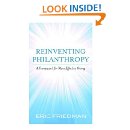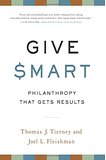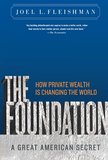Enter your mobile number or email address below and we'll send you a link to download the free Kindle App. Then you can start reading Kindle books on your smartphone, tablet, or computer - no Kindle device required.
-
Apple

-
Android

-
Windows Phone

-
Android

To get the free app, enter your email address or mobile phone number.



Flip to back
Flip to front

Reinventing Philanthropy: A Framework for More Effective Giving Hardcover – September 1, 2013
Books with Buzz
Discover the latest buzz-worthy books, from mysteries and romance to humor and nonfiction. Explore more

$12.88
FREE Shipping on orders with at least $25 of books.
Only 9 left in stock (more on the way).
Ships from and sold by Amazon.com.
Gift-wrap available.
Frequently Bought Together
Customers Who Bought This Item Also Bought
Page 1 of 1 Start overPage 1 of 1
Editorial Reviews
Review
"Read this book before you make your next donation to charity! It could make your donation thousands of times more effective. Philanthropy needs reinventing, and that reinvention will have to start with more thoughtful donors. Friedman's engagingly written book will help you to become one of those more thoughtful donors."
Peter Singer, author of The Life You Can Save, Ira W. DeCamp Professor of Bioethics at Princeton University
"Like the philosopher Peter Singer, Eric Friedman is a radical utilitarian. But while Singer focuses on how much a person should give-almost everything-Friedman concentrates on what one should give to. He argues that the only legitimate objective of philanthropy is maximizing the wellbeing of humanity, regardless of one's personal passions. Even readers who are not prepared to entirely abandon their passions will be pressed to rethink their giving, and they will also pick up some tips for good grantmaking."
Paul Brest, Stanford University, former president, William and Flora Hewlett Foundation
"In our increasingly interconnected world, charitable giving has the potential to save and improve millions of lives. Reinventing Philanthropy is an important read for anyone who wants to spend their money wisely and have it make the greatest impact. Filled with practical advice and compelling case studies, the book gives philanthropists a clear roadmap for how to donate more effectively--and ultimately, achieve transformational results."
Caryl M. Stern, President and CEO, U.S. Fund for UNICEF
"The most funding often goes to the issues with the best PR groups, with the most scary pictures or with the cutest animals. That needs to change. We need to reinvent philanthropy, to focus on getting the most bang for the buck. Eric Fridman shows you how to think smarter and do better."
Bjørn Lomborg, adjunct professor at Copenhagen Business School and director of the Copenhagen Consensus Center
"Reinventing Philanthropy gives voice to a new generation of individual donors. Not everyone will follow Friedman's specific path. But if all follow his lead to focus on impact and think bang-for-buck, individual donors will not only reinvent philanthropy, they will change the world."
Katherina M. Rosqueta, Founding Executive Director, Center for High Impact Philanthropy
"This book shows you how to improve the impact of your charitable contributions, their effect in improving welfare where improvement is most badly needed. United Way will not like it; your alma mater will not like it; your local scout troop and the church that sponsors it will not like it; and maybe the hospital that saved your life won’t like it. But among the ill and the hungry of the world, it may help millions to live longer and healthier if enough people read this book."
--Thomas C. Schelling, Nobel Laureate in Economics, Harvard University and University of Maryland, Emeritus
"This book will push you to think hard about why you really give: is it to feel good, or to truly change the world as effectively as you can? If you agree with everything in the book, this likely means you didnt read it very carefully. Lots of controversial ideas to challenge conventions. The world will be a better place if more people take this hard-nosed analytical approach to philanthropy. What we need now is better ongoing analysis of organizations that helps donors act on the ideals put forward here."
--Dean Karlan, Professor at Yale University, President of Innovations for Poverty Action, co-author of More than Good Intentions: How a New Economics is Helping to Solve Global Poverty
"The norms of charitable giving are too much heart and not enough head. Reinventing Philanthropy seeks to balance the two, exploring techniques for more effective giving. If youre looking to become a more effective donor, this book is a must-read."
--William MacAskill, co-founder of the Centre for Effective Altruism and founder and president of 80,000 Hours, an ethical careers advisory service
Peter Singer, author of The Life You Can Save, Ira W. DeCamp Professor of Bioethics at Princeton University
"Like the philosopher Peter Singer, Eric Friedman is a radical utilitarian. But while Singer focuses on how much a person should give-almost everything-Friedman concentrates on what one should give to. He argues that the only legitimate objective of philanthropy is maximizing the wellbeing of humanity, regardless of one's personal passions. Even readers who are not prepared to entirely abandon their passions will be pressed to rethink their giving, and they will also pick up some tips for good grantmaking."
Paul Brest, Stanford University, former president, William and Flora Hewlett Foundation
"In our increasingly interconnected world, charitable giving has the potential to save and improve millions of lives. Reinventing Philanthropy is an important read for anyone who wants to spend their money wisely and have it make the greatest impact. Filled with practical advice and compelling case studies, the book gives philanthropists a clear roadmap for how to donate more effectively--and ultimately, achieve transformational results."
Caryl M. Stern, President and CEO, U.S. Fund for UNICEF
"The most funding often goes to the issues with the best PR groups, with the most scary pictures or with the cutest animals. That needs to change. We need to reinvent philanthropy, to focus on getting the most bang for the buck. Eric Fridman shows you how to think smarter and do better."
Bjørn Lomborg, adjunct professor at Copenhagen Business School and director of the Copenhagen Consensus Center
"Reinventing Philanthropy gives voice to a new generation of individual donors. Not everyone will follow Friedman's specific path. But if all follow his lead to focus on impact and think bang-for-buck, individual donors will not only reinvent philanthropy, they will change the world."
Katherina M. Rosqueta, Founding Executive Director, Center for High Impact Philanthropy
"This book shows you how to improve the impact of your charitable contributions, their effect in improving welfare where improvement is most badly needed. United Way will not like it; your alma mater will not like it; your local scout troop and the church that sponsors it will not like it; and maybe the hospital that saved your life won’t like it. But among the ill and the hungry of the world, it may help millions to live longer and healthier if enough people read this book."
--Thomas C. Schelling, Nobel Laureate in Economics, Harvard University and University of Maryland, Emeritus
"This book will push you to think hard about why you really give: is it to feel good, or to truly change the world as effectively as you can? If you agree with everything in the book, this likely means you didnt read it very carefully. Lots of controversial ideas to challenge conventions. The world will be a better place if more people take this hard-nosed analytical approach to philanthropy. What we need now is better ongoing analysis of organizations that helps donors act on the ideals put forward here."
--Dean Karlan, Professor at Yale University, President of Innovations for Poverty Action, co-author of More than Good Intentions: How a New Economics is Helping to Solve Global Poverty
"The norms of charitable giving are too much heart and not enough head. Reinventing Philanthropy seeks to balance the two, exploring techniques for more effective giving. If youre looking to become a more effective donor, this book is a must-read."
--William MacAskill, co-founder of the Centre for Effective Altruism and founder and president of 80,000 Hours, an ethical careers advisory service
From the Author
Amazon Readers,
Philanthropy is broken and almost everyone involved knows it. Many donors recognize that they cannot define a "high-performing" nonprofit, let alone identify one. Fundraisers know that the causes getting the most donations are not necessarily the ones that make the greatest impact. Program staff know that tremendous resources--both time and money--are used to engage and solicit donors. Longtime observers of the philanthropic world know that the personal whims and preferences of donors often determine where dollars flow, regardless of need or impact. Philanthropy isn't working as it should, and donors are best positioned to change the status quo.
This book doesn't suggest simple answers to complex problems. Instead, it offers a discussion of some of the critical issues donors should consider. When I first started giving, I was motivated by my emotions and assumed that a quick look at fundraising material was sufficient to pick a good charity. However, as I began to learn more, I not only realized that this was insufficient, but also found myself challenging many commonly accepted views about charitable giving. The book directly addresses controversial issues in charitable giving--to see an example, I encourage you to read chapter 1 from the "look inside" feature of Amazon.
Giving can go a long way to improve the world, and donors who embrace the process of critical thinking are more likely to make a greater impact. I hope that this book helps you through the self-reflection and analysis necessary to reinvent your own philanthropy.
Eric Friedman
Philanthropy is broken and almost everyone involved knows it. Many donors recognize that they cannot define a "high-performing" nonprofit, let alone identify one. Fundraisers know that the causes getting the most donations are not necessarily the ones that make the greatest impact. Program staff know that tremendous resources--both time and money--are used to engage and solicit donors. Longtime observers of the philanthropic world know that the personal whims and preferences of donors often determine where dollars flow, regardless of need or impact. Philanthropy isn't working as it should, and donors are best positioned to change the status quo.
This book doesn't suggest simple answers to complex problems. Instead, it offers a discussion of some of the critical issues donors should consider. When I first started giving, I was motivated by my emotions and assumed that a quick look at fundraising material was sufficient to pick a good charity. However, as I began to learn more, I not only realized that this was insufficient, but also found myself challenging many commonly accepted views about charitable giving. The book directly addresses controversial issues in charitable giving--to see an example, I encourage you to read chapter 1 from the "look inside" feature of Amazon.
Giving can go a long way to improve the world, and donors who embrace the process of critical thinking are more likely to make a greater impact. I hope that this book helps you through the self-reflection and analysis necessary to reinvent your own philanthropy.
Eric Friedman
NO_CONTENT_IN_FEATURE
Start reading Reinventing Philanthropy on your Kindle in under a minute.
Don't have a Kindle? Get your Kindle here, or download a FREE Kindle Reading App.
Don't have a Kindle? Get your Kindle here, or download a FREE Kindle Reading App.
If you’re the author, publisher, or rights holder of this book, let ACX help you produce the audiobook.Learn more.
Product Details
Would you like to update product info or give feedback on images?
|
Set up an Amazon Giveaway

Amazon Giveaway allows you to run promotional giveaways in order to create buzz, reward your audience, and attract new followers and customers. Learn more
This item: Reinventing Philanthropy: A Framework for More Effective Giving











